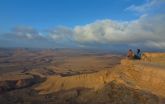
by: Rev. Cheryl Hauer, International Development Director

Dafna Tal/goisrael.com
Israel is an amazing country. As you peruse the pages of this magazine, you may discover things about this incredible place that you might not have known. You may be surprised as you learn about the size of the country, the prophecies God is fulfilling here in our lifetime, the beauty and majesty of the Land itself or the remarkable blessing that Israel is to the rest of the world. But the wonder doesn’t stop there. Wander through Jerusalem on streets once traveled by Israel’s prophets and hear echoes of antiquity mingled with the sounds of a modern metropolis. Meet the people that God has regathered from the four corners of the earth, fall in love with your Bible as its pages are illuminated by the Land that gave it birth, and discover that around every corner awaits another life-changing encounter. God has left His fingerprints all over this Land and there is just so much to learn. For instance, did you know….
 Israel is among the top ten happiest nations on earth. And not just the people, even the cows are happy! They give more milk than any cows in the world (except South Korea)…each gives nearly 13,000 liters per year. Maybe that’s why it is called the land of milk and honey (Exod. 3:8, 17).
Israel is among the top ten happiest nations on earth. And not just the people, even the cows are happy! They give more milk than any cows in the world (except South Korea)…each gives nearly 13,000 liters per year. Maybe that’s why it is called the land of milk and honey (Exod. 3:8, 17).

Ryan Rodrick Beiler/shutterstock.com
Israel is a nation that was literally born in a day and today is a vibrant democracy with over 30 political parties. It is also the only Middle Eastern nation where Arab women can vote, where freedom of the Arab press is protected, where the Christian population is growing rather than shrinking and where freedom of religion is absolutely guaranteed.
After the destruction of the Temple and the dispersion of the Jewish people, the Land became a desolate and barren wilderness. Nothing grew, rain scarcely fell and most of Israel’s trees were cut down as tribute to absentee landlords. Since the rebirth of the State in 1948, however, Israelis have planted over 240 million trees, turning many parts of the country into lush forests covering over 240,000 acres. Israel is one of only two countries in the world that entered the 21st century with a net gain in its number of trees.
_idf_cut_165_110_80.jpg) Speaking of trees, they have always been a treasured commodity here in the Middle East, so much so that Israel has a festival dedicated to celebrating them! Known as the new year for trees, the holiday is called TuB’shvat, and is marked by eating the bounty of Israel’s trees: grapes, figs, pomegranates, olives and dates. Remembering that man is “a tree of the field,” (Deut. 20:19), it is a time to reflect on God’s provision and man’s responsibility to care for his environment.
Speaking of trees, they have always been a treasured commodity here in the Middle East, so much so that Israel has a festival dedicated to celebrating them! Known as the new year for trees, the holiday is called TuB’shvat, and is marked by eating the bounty of Israel’s trees: grapes, figs, pomegranates, olives and dates. Remembering that man is “a tree of the field,” (Deut. 20:19), it is a time to reflect on God’s provision and man’s responsibility to care for his environment.
Jews and Christians often have very different world views. To many in the Christian world, faith is an intellectual exercise while to the Jewish people it is all about action. As a matter of fact, Israelis believe that actions speak much louder than words. A Jewish friend once remarked, “Please don’t tell me what you believe. Allow me to walk with you for two weeks, then I’ll tell you what you believe.” That’s why acts of compassion such as those performed by Bridges for Peace volunteers are so important in building relationships of respect and understanding between our two communities.

IDF Spokesperson’s Unit
Israel is often first on the scene with emergency assistance and medical care when disaster strikes anywhere in the world. From Turkey to Haiti, Kenya to Japan, Israel has brought life-saving technologies, equipment and personnel to countries overwhelmed by catastrophe. Not only that, Israel feels a responsibility to care for her enemies as well as her friends. Field hospitals on the border with Syria make it possible for Israeli doctors to treat the wounded from the Syrian civil war, sometimes even transferring them at no cost to other hospitals throughout Israel for specialty care. During the most recent conflict with Hamas in the Gaza Strip, a similar field hospital was erected on that border to care for wounded Palestinians—civilians and military alike.

blueness/shutterstock.com
As the Jewish people were dispersed throughout the world, Hebrew fell from everyday use and was relegated to a language of religious ritual. But in the mid-nineteenth century, a European newspaper editor named Eliezer Ben Yehuda set about reviving Hebrew. Moving to Israel, he wrote Hebrew dictionaries, formed language societies and created words for items that had no biblical counterparts. By the rebirth of the nation in 1948, Hebrew was a vibrant, thriving modern language, the only one in history to have been resurrected from the dead! Today it is the national language of the State of Israel and is spoken by millions around the world as well.
__165_158_80.jpg)
Photo by Adherent
God promised Israel that “in that day” He would fill the land with fruit, that flowers would cover the hillsides, that the desert would bloom. Today, every time you smell a flower or eat a strawberry in this country, you are participating in Bible prophecy! After reclaiming the Land in the mid-20th century, Israel now exports fruit and flowers all over the world and is at the forefront of agricultural advances to help other nations feed their people even under the most difficult of circumstances. Drip irrigation, potatoes that grow without water…even the beloved cherry tomato that grows in the desert are all Israeli innovations…and prophecy fulfilled as well!
When Jesus was asked in Mark 12:28 what is the greatest commandment, His answer was not a creedal statement of a new religion. He was actually quoting from the book of Deuteronomy when He said, Hear, O Israel, the Lord our God, the Lord is one. And you shall love the Lord your God with all your heart, with all your soul, and with all your strength.” Called the Shema (Deut.6:4–5), Judaism considers it the most important Scripture in the entire Bible.
All logos and trademarks in this site are property of their respective owner. All other materials are property of Bridges for Peace. Copyright © 2025.
Website Site Design by J-Town Internet Services Ltd. - Based in Jerusalem and Serving the World.